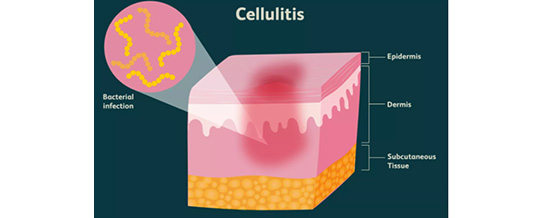How to Care for Your Child with Cellulitis
This leaflet will provide you with information about Cellulitis, symptoms, diagnosis, treatment, and home care advices.

What is Cellulitis?
Cellulitis is a bacterial infection of the skin. It can happen in a normal skin but commonly caused by minor trauma such as bite or injuries that might have been in the water.
What are the symptoms of Cellulitis?
- Fever and /or chills
- Headache
- Muscle aches or joint stiffness
- Swelling of the skin
- Pain and Tenderness
- Bruises and/or blistering
- Swollen glands
How is Cellulitis diagnosed?
The doctor will ask few questions about your child’s health and then examine your child. Your doctor will decide if further investigation and blood tests are required.
How is Cellulitis treated?
Your child will be treated with antibiotics and should begin to feel better within a couple of days. You may be advised to make a follow-up appointment to make sure the cellulitis is improving.
If your doctor advises to give your child medicine for pain or fever, you can give Paracetamol (any brand) or Ibuprofen (any brand).
- Follow the instruction on the medicine package for the correct dose for your child
- Do not give Aspirin to your child as this can cause serious complication
Home care advice
- Ensure your child take the antibiotics regularly as prescribed
- Wash your hands before and after touching the infected area
- Elevation all the affected area. This will help reduce the swelling and help with the healing process.
- If the affected area is the arm, this should be kept above the level of the heart
- If the affected area is the leg, this should be kept above the level of the hips
- Ensure your child attend any follow-up appointment
When should I seek medical advice?
Seek medical advice if your child:
- Not taking the antibiotics regularly
- Has fever for more than 3 days
- Not getting better despite home care advice
- There is a spread of the area of redness
- You are concerned that your child is not getting better and not responding to treatment
Go to the Emergency Department if your child:
- Is unable to drink any liquids
- Appears dry and less energetic

